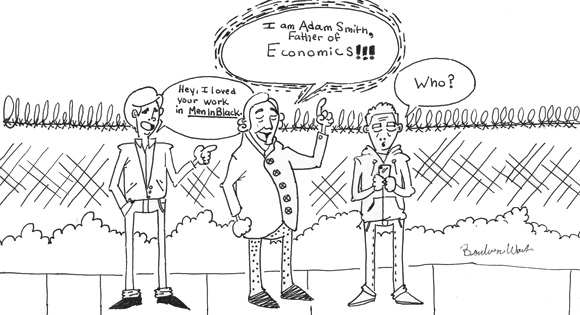
We cannot all be experts at foreign trade, metal exchange or sovereign debt markets, but there is certainly something missing in our education when it comes to the economy.
Money shapes our lives. When we are born, our parents’ money decides if we are going to be born in a better or worse hospital.
Later, it will decide our education, our clothing, our friends and our vacations. Then, when we start earning our own money, it is the same cycle over and over again.
A recent Bloomberg National Poll showed that “Americans’ pessimism about the economy has deepened, and confidence in both political parties has fallen with only 20 percent saying the country is on the right course.” According to these results, the average American believes that the economy is bad, but nobody has a clue how to fix it.
Still, we are perfectly OK with our economic ignorance. We hear things like “the Dow Jones lost 0.72 pecent in the morning” or “China’s GDP grows 8 percent per year” and we do not care at all what that means. For sure, we know that money is a big driver in our lives, but beyond that, who cares?
Even if we do care, it gets too complicated to be understood, and in many cases, we do not even have the time to accumulate enough knowledge. We already have a major at school. Some people even have double majors and minors. Many students have a job or two. Others go straight from classes to clubs.
Ask any of your friends majoring in economics, and even they probably have trouble explaining how money has a value, who gives value to it or why suddenly the economic crisis shows up on television and everybody starts losing their jobs and savings.
In theory, we should not have to worry about it. As a doctor does not worry about how to pilot an aircraft, or a lawyer about how to build a bridge, we, as citizens, should not have to worry about something that we entrusted to our politicians and economists.
Having to keep an eye on them is like babysitting a four-year-old. That is definitely not the way citizens should feel about their representatives. Instead of thinking they are good and make mistakes, we tend to think they are bad and sometimes do things right. These are people managing the national budget — everybody’s money.
Of course, deciding who is doing right or wrong often comes hand-in-hand with partisan views. Some people believe that the deregulation of the markets led to this global financial crisis.
However, in the early 2000’s, the housing markets were booming and the price of a house increased in double digits every year, and economists started to worry about the burst of the bubble. The Federal Reserve was keeping their interest rates low and banks were willing to lend money without all the securities they should have had for returning the money.
Phil Gramm, current vice president of investments at UBS, Switzerland’s largest bank, and former economic advisor to Sen. John McCain, offered some key considerations in an article for the Wall Street Journal in 2009.
“The principal alternative to the politicization of mortgage lending and bad monetary policy as causes of the financial crisis is deregulation,” Gramm said in the article “Deregulation and the Financial Panic.”
In the end, we are at the bottom of the pyramid and believe ourselves to have absolutely no control over these kinds of affairs. Therefore, we do not worry about these things. We default to oblivion, hoping that, if we do not see it, it disappears. The International Monetary Fund estimates the U.S. GDP for 2010 is $14.7 trillion, but who understands how much money that is?
Instead of this oblivion, citizens can stay informed by setting up a Twitter account and following the tweets of The Economist, the Wall Street Journal, Reuters, Bloomberg or Forbes.
You don’t like Twitter? Get an RSS application and subscribe to the major economic analysts. Start reading articles, ask questions to those who know more than you or watch CNN instead of ESPN (OK, that might be too hard).
Knowledge about our economic system will not harm us. We certainly can know much more than we do now.
Federico Garcia Lorca is a senior in the Parks College of Engineering, Aviation and Technology.











